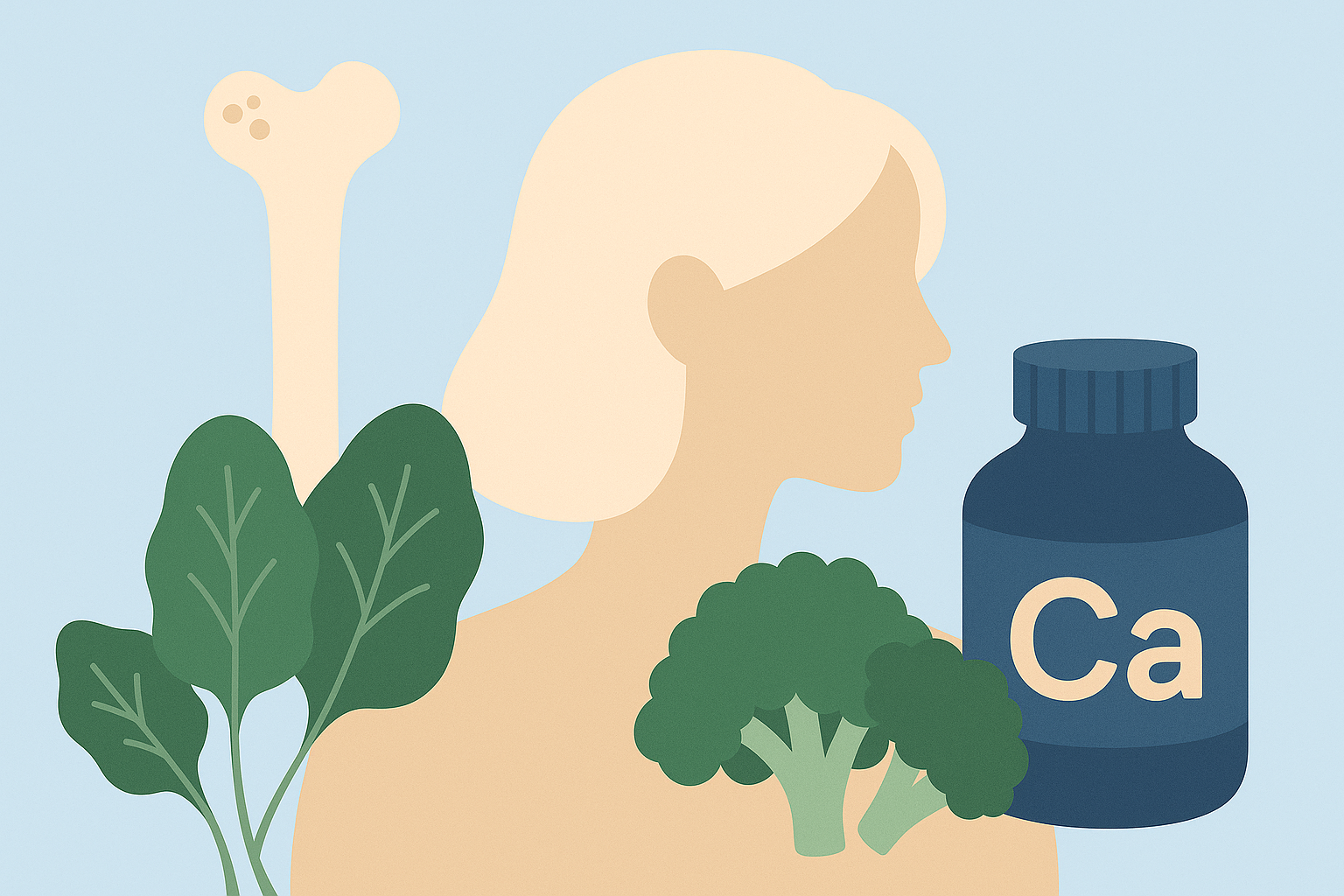Calcium plays a vital role in women’s health, yet calcium deficiency is surprisingly common in the United States. From supporting strong bones and teeth to enabling muscle function and nerve signaling, calcium is essential for overall well-being. According to the National Institutes of Health, many women—especially postmenopausal women and young adults—do not meet the daily recommended calcium intake. In this guide, we’ll explore the common signs of calcium deficiency in women, its causes, and the most effective ways to correct it. Whether you’re a young adult, a busy mom, or navigating menopause, understanding your calcium needs can help you prevent long-term health issues.
Disclaimer: This content is for informational purposes only and does not constitute medical advice. Please consult a healthcare professional before making any changes to your supplement or diet regimen.
What Is Calcium Deficiency in Women?
Calcium deficiency in women—also called hypocalcemia—occurs when blood calcium levels drop below normal. This deficiency can lead to weakened bones, muscle cramps, fatigue, and even emotional disturbances. If left untreated, it can significantly increase the risk of osteoporosis, especially in women over 50.
Why Is Calcium Important for Women?
- Bone Health: Women are at a higher risk of osteoporosis than men.
- Hormonal Changes: Estrogen loss during menopause affects calcium absorption.
- Pregnancy & Breastfeeding: These stages demand higher calcium intake.
- Preventing Premenstrual Syndrome (PMS): Calcium helps manage PMS symptoms.
Common Signs of Calcium Deficiency in Women
Your body will alert you if you aren’t receiving enough calcium. These are the most typical ones:
- Frequent Muscle Cramps and Spasms
- Numbness or Tingling in Fingers and Toes
- Fatigue or Weakness
- Brittle Nails and Hair Loss
- Tooth Decay and Gum Issues
- Irregular Heartbeat or Chest Pain
- Difficulty Sleeping
- Mood Swings, Anxiety, or Depression
What Causes Calcium Deficiency in Women?
Several factors can lead to low calcium levels:
- Poor Diet: Not consuming enough calcium-rich foods.
- Vitamin D Deficiency: Vitamin D helps your body absorb calcium. Without it, you can’t properly utilize calcium. Read more on Vitamin D-rich foods in the U.S..
- Age and Hormonal Changes: Women over 50 need more calcium.
- Medical Conditions: Kidney disease, thyroid disorders, or gastrointestinal issues can impact calcium levels.
- Certain Medications: Some medications—such as diuretics, corticosteroids, and anticonvulsants—can interfere with calcium absorption.
For further insight, check out this helpful article on Healthline about calcium deficiency.
How to Fix Calcium Deficiency in Women
Let’s dive into practical solutions:
1. Eat More Calcium-Rich Foods
Foods such as dairy, leafy greens, almonds, and fortified cereals can help. For a detailed list, check out our article on Calcium-Rich Foods.
2. Balance Calcium with Magnesium and Vitamin D
These nutrients work synergistically. Without enough magnesium, calcium may not be absorbed effectively. Explore our guide to Magnesium for Women.
Also, be sure to include foods rich in both calcium and vitamin D to maximize the benefits.
3. Take the Right Supplements
There are two main forms:
- Calcium Citrate: Best absorbed on an empty stomach
- Calcium Carbonate: Best taken with food
Learn which type is best for you in our article Calcium Citrate vs. Calcium Carbonate.
Looking for a quality supplement? Check out this top-rated calcium supplement on Amazon
(affiliate link – it helps support our blog at no extra cost to you).
4. Lifestyle Adjustments
- Exercise frequently: Strength training and weight-bearing activities like walking increase bone density.
- Limit Caffeine and Alcohol: Both can interfere with calcium absorption.
- Quit Smoking: Smoking reduces estrogen levels and weakens bones.
FAQs About Calcium Deficiency in Women
Q1: How much calcium do women need daily?
Most adult women need 1,000–1,200 mg per day, depending on age and pregnancy status.
Q2: Can I take calcium supplements without a doctor’s advice?
It’s advisable to speak with your doctor, particularly if you take other medications or have underlying health conditions.
Q3: How do I know if I have a calcium deficiency?
The most precise method of measuring calcium levels is a blood test. Keep an eye out for signs including cramping, brittle nails, and exhaustion.
Q4: Are plant-based sources of calcium enough?
Yes, but you may need to consume them in higher quantities or combine with vitamin D-rich foods for better absorption.
Q5: Is calcium important after menopause?
Absolutely. Postmenopausal women are at high risk for osteoporosis and should prioritize calcium intake.
Conclusion: Take Charge of Your Calcium Health
Calcium deficiency in women is more common than you might think—but it’s also highly preventable. With a balanced diet, the right supplements, and smart lifestyle changes, you can protect your bones, boost your energy, and improve your overall health. Don’t wait until symptoms appear—take action now.
Call to Action
Ready to take the first step? 👉 Start by reviewing your daily intake and adding more calcium-rich foods to your meals. 💬 Share this article with a friend or loved one who could benefit from this info. 🛒 And if you’re considering a supplement, check out this one on Amazon to support your health journey.
For more in-depth wellness guides, explore other topics on FitFusionBlogs.com!

